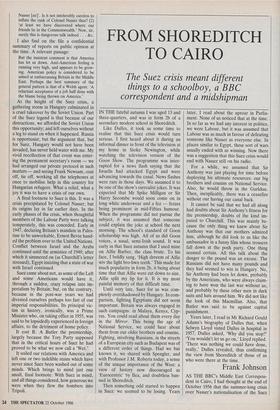FROM SHOREDITCH TO CAIRO
The Suez crisis meant different things to a schoolboy, a BBC correspondent and a midshipman
IN THE fateful autumn I was aged 13 and three-quarters, and was in form 2b of a secondary modern school in Shoreditch.
Like Dulles, it took us some time to realise that this Suez crisis would turn serious. I first heard about it during an informal dinner in front of the television at my home in Stoke Newington, while watching the television version of the Goon Show. The programme was inter- rupted for a news flash saying that the Israelis had attacked Egypt and were advancing towards the canal. News flashes were rare in those days. We assumed it to be one of the show's surrealist jokes. It was expected that Mr Spike Milligan or Sir Harry Secombe would soon come on in long white underwear and a fez — fezzes being prominent in mid-Fifties humour. When the programme did not pursue the subject, it was assumed that someone could explain the joke at school the next morning. The school's standard of Goon scholarship was high. All of us did Goon voices, a nasal, semi-Irish sound. It was early in that Suez autumn that I used mine on Alfie Barber, the class brute. To his face, I boldly sang, 'High dreeem of Alfie wiv the light bro-hwn teeth.' This made for much popularity in form 2b, it being about time that that Alfie were cut down to size. Alfie split my lip for it. It is my most painful memory of that difficult time.
Until very late, Suez for us was com- pletely overshadowed by Hungary. In com- parison, fighting Egyptians did not seem important. Britain was always engaged in such campaigns: in Malaya, Kenya, Cyp- rus. You could read about them every day in the Mirror. This being the age of National Service, we could hear about them from our older brothers and cousins. Fighting, involving Russians, in the streets of a European city such as Budapest was of a different order of things. Had we but known it, we shared with Spengler, and with Professor J.M. Roberts today, a sense of the unique importance of the West: a view of history now discouraged as 'Eurocentric' by Ilea, and doubtless ban- ned in Shoreditch.
Then something odd started to happen in Suez: we seemed to be losing. Years later, I read about the uproar in Parlia- ment. None of us noticed that at the time. In so far as we had any interest in politics, we were Labour, but it was assumed that Labour was as much in favour of defeating someone like Nasser as everyone else. In places similar to Egypt, these sort of wars usually ended with us winning. Now there was a suggestion that this Suez crisis would end with Nasser still on his radio.
For a while, we assumed that Sir Anthony was just playing for time before deploying his ultimate resources: our big brothers and cousins on National Service. Also, he would throw in the Gurkhas. Then, inexplicably, there was a ceasefire without our having our canal back.
It cannot be said that we had all along had doubts about Sir Anthony's fitness for the premiership, doubts of the kind im- puted to Churchill. This was mainly be- cause the only thing we knew about Sir Anthony was that our mothers admired him, although he did look to us like the ambassador in a funny film whose trousers fall down at the posh party. One thing seemed certain. All this talk about the danger to the pound was an excuse. The Russians did not have many pounds and they had seemed to win in Hungary. No, Sir Anthony had been let down, probably by the Americans, who were always claim- ing to have won the last war without us, and probably by these other men in dark suits and hats around him. We did not like the look of this Macmillan. Also, that Butler was said to be against capital punishment.
Years later, I read in Mr Richard Gould Adams's biography of Dulles that, when Selwyn Lloyd visted Dulles in hospital in 1957, Dulles asked, 'Why did you stop?' 'You wouldn't let us go on,' Lloyd replied. 'There was "nothing we could have done, really,' Dulles revealed, thus confirming the view from Shoreditch of those of us who were there at the time.
Frank Johnson


























































 Previous page
Previous page